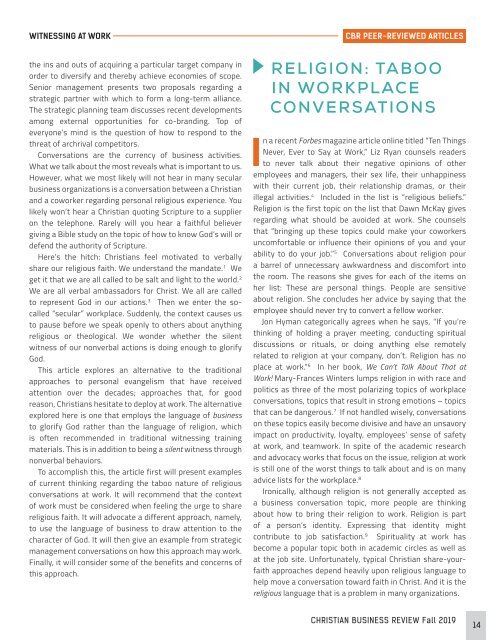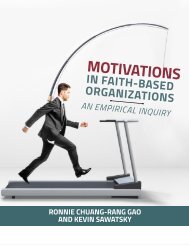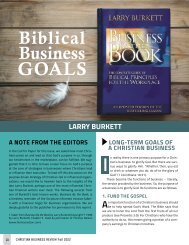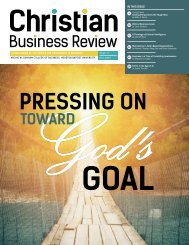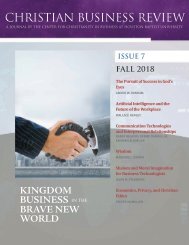Christian Business Review 2019: Workplace Practices That Glorify God (Issue 8)
You also want an ePaper? Increase the reach of your titles
YUMPU automatically turns print PDFs into web optimized ePapers that Google loves.
WITNESSING AT WORK<br />
CBR PEER-REVIEWED ARTICLES<br />
the ins and outs of acquiring a particular target company in<br />
order to diversify and thereby achieve economies of scope.<br />
Senior management presents two proposals regarding a<br />
strategic partner with which to form a long-term alliance.<br />
The strategic planning team discusses recent developments<br />
among external opportunities for co-branding. Top of<br />
everyone’s mind is the question of how to respond to the<br />
threat of archrival competitors.<br />
Conversations are the currency of business activities.<br />
What we talk about the most reveals what is important to us.<br />
However, what we most likely will not hear in many secular<br />
business organizations is a conversation between a <strong>Christian</strong><br />
and a coworker regarding personal religious experience. You<br />
likely won’t hear a <strong>Christian</strong> quoting Scripture to a supplier<br />
on the telephone. Rarely will you hear a faithful believer<br />
giving a Bible study on the topic of how to know <strong>God</strong>’s will or<br />
defend the authority of Scripture.<br />
Here’s the hitch: <strong>Christian</strong>s feel motivated to verbally<br />
share our religious faith. We understand the mandate. 1 We<br />
get it that we are all called to be salt and light to the world. 2<br />
We are all verbal ambassadors for Christ. We all are called<br />
to represent <strong>God</strong> in our actions. 3 Then we enter the socalled<br />
“secular” workplace. Suddenly, the context causes us<br />
to pause before we speak openly to others about anything<br />
religious or theological. We wonder whether the silent<br />
witness of our nonverbal actions is doing enough to glorify<br />
<strong>God</strong>.<br />
This article explores an alternative to the traditional<br />
approaches to personal evangelism that have received<br />
attention over the decades; approaches that, for good<br />
reason, <strong>Christian</strong>s hesitate to deploy at work. The alternative<br />
explored here is one that employs the language of business<br />
to glorify <strong>God</strong> rather than the language of religion, which<br />
is often recommended in traditional witnessing training<br />
materials. This is in addition to being a silent witness through<br />
nonverbal behaviors.<br />
To accomplish this, the article first will present examples<br />
of current thinking regarding the taboo nature of religious<br />
conversations at work. It will recommend that the context<br />
of work must be considered when feeling the urge to share<br />
religious faith. It will advocate a different approach, namely,<br />
to use the language of business to draw attention to the<br />
character of <strong>God</strong>. It will then give an example from strategic<br />
management conversations on how this approach may work.<br />
Finally, it will consider some of the benefits and concerns of<br />
this approach.<br />
RELIGION: TABOO<br />
IN WORKPLACE<br />
CONVERSATIONS<br />
In a recent Forbes magazine article online titled “Ten Things<br />
Never, Ever to Say at Work,” Liz Ryan counsels readers<br />
to never talk about their negative opinions of other<br />
employees and managers, their sex life, their unhappiness<br />
with their current job, their relationship dramas, or their<br />
illegal activities. 4 Included in the list is “religious beliefs.”<br />
Religion is the first topic on the list that Dawn McKay gives<br />
regarding what should be avoided at work. She counsels<br />
that “bringing up these topics could make your coworkers<br />
uncomfortable or influence their opinions of you and your<br />
ability to do your job.” 5 Conversations about religion pour<br />
a barrel of unnecessary awkwardness and discomfort into<br />
the room. The reasons she gives for each of the items on<br />
her list: These are personal things. People are sensitive<br />
about religion. She concludes her advice by saying that the<br />
employee should never try to convert a fellow worker.<br />
Jon Hyman categorically agrees when he says, “If you’re<br />
thinking of holding a prayer meeting, conducting spiritual<br />
discussions or rituals, or doing anything else remotely<br />
related to religion at your company, don’t. Religion has no<br />
place at work.” 6 In her book, We Can’t Talk About <strong>That</strong> at<br />
Work! Mary-Frances Winters lumps religion in with race and<br />
politics as three of the most polarizing topics of workplace<br />
conversations, topics that result in strong emotions – topics<br />
that can be dangerous. 7 If not handled wisely, conversations<br />
on these topics easily become divisive and have an unsavory<br />
impact on productivity, loyalty, employees’ sense of safety<br />
at work, and teamwork. In spite of the academic research<br />
and advocacy works that focus on the issue, religion at work<br />
is still one of the worst things to talk about and is on many<br />
advice lists for the workplace. 8<br />
Ironically, although religion is not generally accepted as<br />
a business conversation topic, more people are thinking<br />
about how to bring their religion to work. Religion is part<br />
of a person’s identity. Expressing that identity might<br />
contribute to job satisfaction. 9 Spirituality at work has<br />
become a popular topic both in academic circles as well as<br />
at the job site. Unfortunately, typical <strong>Christian</strong> share-yourfaith<br />
approaches depend heavily upon religious language to<br />
help move a conversation toward faith in Christ. And it is the<br />
religious language that is a problem in many organizations.<br />
CHRISTIAN BUSINESS REVIEW Fall <strong>2019</strong><br />
14 2


